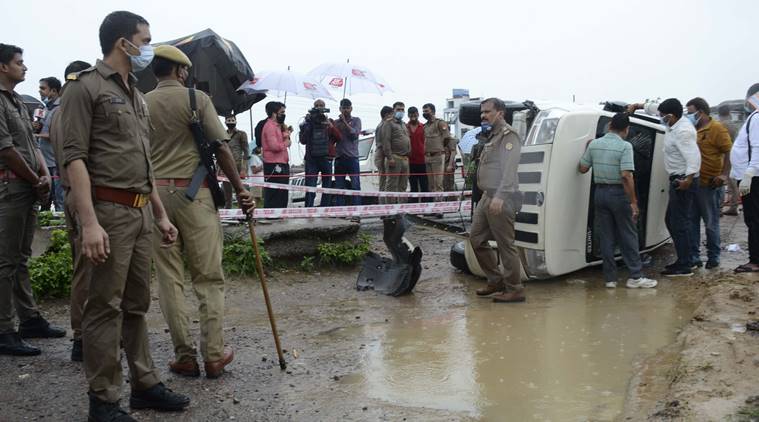 Police officers cordon the site where Vikas Dubey was killed near Kanpur (AP Photo)
Police officers cordon the site where Vikas Dubey was killed near Kanpur (AP Photo)
The custodial deaths in Thoothukudi and the killing of eight policemen in an ambush in Uttar Pradesh has brought the country’s police force under scrutiny. The story of Vikas Dubey and his “encounter” killing almost sounds like a Bollywood film plot. The police’s narrative — the car overturning, Dubey snatching the service pistol and attempting to run — does not seem convincing.
When the Hindi novelist, Ved Prakash Sharma wrote Vardi Wala Gunda (A Goon in Uniform), he probably did not anticipate real life events imitating fiction. The novel sold more than 80 million copies, bringing respect to the world of pulp fiction. The epithet used by the novelist to describe the police rings true in light of the custodial deaths in Thoothukudi and the Vikas Dubey encounter.
The killing of George Floyd in Minneapolis led to a series of protests against police atrocities in the US, culminating into the Black Lives Matter campaign. The Minneapolis council, in fact, has drafted a plan to abolish the police and replace it with a department of community safety and violence prevention. No such outrage has been felt in India. Some people justify police violence in Kashmir and the Northeast as the only solution to the insurgency. People, in fact, rarely object when they see policemen slapping people or asking them to do sit-ups.
The maintenance of law and order is primarily the responsibility of the states — Delhi being an exception. However, police departments are headed by an IPS officer providing the system an anchor at the Central level. These officers are trained at the Lal Bahadur Shastri National Academy for Administration, Mussorie and Sardar Vallabhbhai Patel National Police Academy (NPA) at Hyderabad. Lower-level officials and constables are trained at different state police academies. There are also two police universities in the country and the home ministry has recently approved the creation of a national police university. However, at the lower rungs, much of the force uses strong arm tactics that date back to the colonial era.
One needs to be a graduate to become an IPS officer. But for recruitment at the lower levels of the force, only the physical agility of the candidate is tested. An IPS officer is trained for about two years, an inspector-level officer receives an year’s training and a constable is trained for nine months. The quality of training varies according to state. But, by and large, officials at the lower rungs only receive basic training for field challenges — human rights issues are not an essential part of their training. This is probably why a remark in dissent by Jeyaraj in Thoothukudi led to the gruesome police violence against him.
While “depolicing society” is often discussed in the media and the issue often comes up in political rhetoric, conversations on its nature and scope lack academic rigour. But such conversations are needed because as the satirist Hari Shankar Parsai showed in Inspector Matadin Chand Par, policing de-humanises society — including the police force itself. The Bureau for Police Research and Development was established in 1970 for the “modernisation” of police. The institution has rarely engaged with human rights issues.
Only a few states have in-service training for lower level officers and the constabulary. Police officials work 10 to 16 hours, seven days a week, which takes a toll on the health of several officers. The “Status of Policing in India Report 2019” points out that 70 police stations across 20 states do not have wireless facilities and 214 police stations do not have a telephone. More than 40 per cent of police stations in the country cannot avail the help of forensic technology. All this is bound to affect the functioning of the police and reflect in the ways they engage with the public.
It is high time that we address the infrastructural and organisational issues and concerns related to the police. Moreover, there is a need to evolve a National Curriculum Framework (NCF) for police education and training, like that for teachers, and medical and engineering services. The curriculum must be informed by discussions at different levels — universities, NPA and the society itself. A progressive and democratic society and an aspiring economic superpower cannot be policed by a regressive system. An NCF can help the police act according to its motto, “With you, For you, Always”.
The writer is faculty, Department of Education, Central University of Himachal Pradesh, Dharamsala. Views expressed
are personal